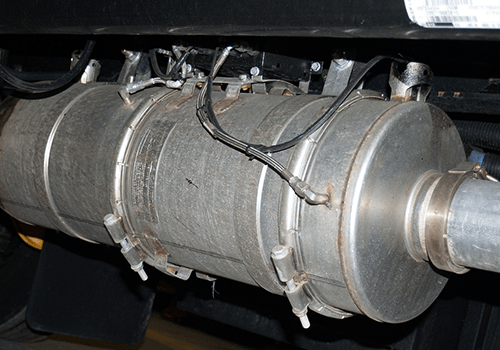
The diesel particulate filter (DPF) is an exhaust component designed to remove soot from the exhaust gas of a diesel engine. First considered in the 1970’s after concerns of inhaled particulates, particulate filters have been in use on non-road machines since 1980, and in automobiles since 1985. Since 2007, DPFs have been required on all diesel vehicles manufactured for road use.
However, diesel particulate filters must be cleaned from time to time or they will block up. When a DPF is plugged up and not regenerated, owners may see issues with drive-ability or damage to the engine or filter itself.
DPF filters go through a regeneration process which removes this soot and lowers the filter pressure. There are three types of regeneration: active, passive, and forced. Active regeneration happens while the vehicle is not in use and takes 10 minutes on average to complete. Passive regeneration takes place while driving using the heat of the exhaust. This works well for vehicles that drive longer distances with few stops compared to those that perform short trips with many starts and stops. If the filter develops too much pressure then the last type of regeneration must be used – a forced regeneration. This involves a garage using a computer program to run the car, initiating a manual regeneration of the DPF.
In 2016 we tested Everyday Diesel Treatment and Diesel Extreme with multiple trucks owned by the City of Columbus, OH. Their fleet had issues with high regeneration costs and difficulty keeping trucks on the road. With an initial treatment of Diesel Extreme in each truck, as well as follow up doses of Everyday Diesel Treatment, the City of Columbus saw a dramatic reduction in the need for regenerations. We developed a white paper focusing on two of their trucks, a 2008 Freightliner M2 106 TA and a 2013 F-550 6.7L Powerstroke. These two trucks averaged three regenerations a month. By using these two fuel additives in these two trucks, the City of Columbus reported they now require a regeneration once every two months! Between the reduction in maintenance costs, downtime, and fuel economy increase, the city would save more than $4,000 a year just by treating these two trucks! Read the white paper here.
How does Everyday Diesel Treatment and Diesel Extreme affect the DPF? They help address regeneration issues by optimizing the combustion of fuel in the chamber. By maximizing cetane levels and addressing the most common fuel quality issues (moisture, asphaltenes, low lubricity, etc.) the fuel will burn smoothly and evenly, resulting in a more complete burn. This complete burn results in less carbon being sent to the DPF; allowing the DPF to, in a sense, “catch up” with the current build up. We’ve seen reductions in opacity tests which also provide insight on how our products can affect the exhaust system.
Recently, YouTube user dieselrsm; the owner of a 2016 6.7L Cummins with 35k miles started having regeneration issues. His truck would typically use passive regenerations as he drove down the highway. Around 35,000 miles, his truck’s display read “DPF full, regen in process” for the first time. The display counted down from 100% and acted fine the rest of that day. But every day after that he would have the message reoccur once a day. He used a competitor’s product trying to correct the issue; but the result was the regeneration notification repeatedly for over thirty miles. Desperate for an answer, he stopped by a local auto parts store and picked up our Diesel Extreme. He’s at over 50,000 miles now and hasn’t seen the regen notification since!
Here’s the video:
dieselrsm is in no way affiliated with Hot Shot’s Secret; the above video was posted by dieselrsm on January 13, 2017. View his channel here: dieselrsm’s channel
Another common issue with modern emission equipment is a dirty or clogged EGR valve. The Exhaust Gas Recirculation (EGR) valve is an anti-pollution device, designed to reduce the amount of nitrogen oxide (NOx) spewing out of a vehicle’s exhaust pipe. Exhaust Gas Recirculation works by recirculating a controlled portion of an engine’s exhaust fumes back into the engine. The EGR valve turns the flow of exhaust gases on and off. While Diesel Extreme and Everyday Diesel Treatment can help slow down or completely stop the addition of buildup on your EGR valve (diesel engines only), many times you’ll need to get your hands dirty to clean the EGR valve or even replace it if the buildup is severe enough.
